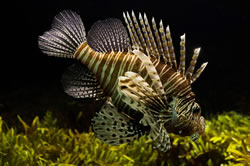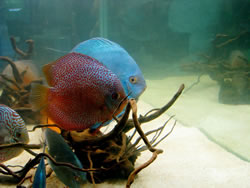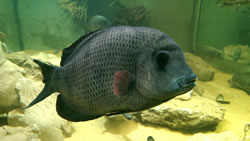 Keeping fish is a wonderful hobby and as far as pets go, fish are pretty well-behaved. Not necessarily low-maintenance, but they won't leave your house in a mess!
Keeping fish is a wonderful hobby and as far as pets go, fish are pretty well-behaved. Not necessarily low-maintenance, but they won't leave your house in a mess!
Fish are also pretty clean right? No chances of any infections or any other health issues to worry about right?
Well if you are a responsible fish keeper then yes, fish are very safe, but don't be fooled into thinking that there are no risks at all. Zoonotic illnesses do exist and if you keep fish you need to be aware of those risks and how to minimise them.
Side note:
In case you are not familiar with the term, a Zoonotic disease is simply one that can be passed from an animal to a human. Clearly, that's a bad thing, and it's not just fish, any animal comes with a risk of zoonotic illness.
The most common zoonotic illness that fish keepers need to know about is an infection courtesy of Mycobacterium marinum (marine microbacteria), although fortunately even this is rare.
Never the less, in the name of responsible fish keeping, here are some ways to minimise your risks and keep you and your fish healthy.
Wash your hands
This is the simplest of advice and you probably already know that you should be doing this, but maybe you didn't know why... Well zoonotic disease is another great reason to be washing your hands after every time that you touch anything in your fish tank.
It's so easy to do, and will prevent any risk of infection in the vast majority of cases.
Cleaning in the kitchen
This is a big no no, yet it's something that so many fish keepers do. Cleaning out your fish tank in the kitchen is inevitably going to lead to cross contamination. You never know what bacteria are in your water and a small splash onto a kitchen work surface could lead to that bacteria getting into your food.
As well as being an icky idea it's also a great way to give yourself and your family some nasty bugs. So if you have done this recently, make sure you go and sanitise your entire kitchen right now... Go on, I'll wait...
Dumping water
On the same note as the previous point, it's also not a great idea to pour tank water down the kitchen sink. In fact, just keep your fish out of the kitchen all together if possible. Find a safe and sanitary place to dispose of old water.
 Stay out of the water
Stay out of the water
Sometimes you may have to get yourself wet, but as much as possible try to avoid going in the water - your fish probably won't appreciate it anyway.
By using magnetic cleaners for routine tasks and scrapers and tongs for other chores you can vastly reduce your need to get any water on your skin, and that reduces the risk a lot.
Open wounds
This should go without saying really, but you should never touch the water when you have an open wound or broken skin. If you have any cuts, wear gloves or just avoid going in the tank until your wounds have healed.
Keep it covered
Keeping your tank covered is a good idea for several reasons, firstly it will prevent your fish from escaping, which isn't good for anyone involved.
But secondly it will prevent water from splashing out of the tank and will prevent other pets or kids from playing in the water, which is good for your health and your fish.
 Buy fish responsibly
Buy fish responsibly
Sadly, as I mentioned in my recent post 3 threats to fish keeping, there are some unscrupulous fish dealers who practice dodgy techniques such as giving their fish antibiotics to help them grow faster and also mask any diseases.
Buying diseased fish can cause cross contamination as well as helping to support these unethical businesses, so ensure that you buy healthy fish from a reputable retailer.
Monitor fish health
Of course, no matter what you do, there is always a risk that your fish will get sick. It's heart breaking when it happens and often there is little you can do. But you should check your fish regularly and look out for signs of lethargy, unusual behaviour and not swimming in the correct position.
If you suspect a fish is sick you should remove it and place it in a quarantine tank as soon as possible to lower the risk of other fish becoming infected.
And Remember to go to the doctor...
Well hopefully if you follow all of these simple tips you will never experience the problems of sick fish and zoonotic disease, but no matter what you do there will always be a small risk, so my final advice is that you know the signs too look out for.
The most common symptom of fish related illness is sores on the hands and raw skin, so if you spot the signs, go to a doctor immediately and tell him that you keep fish and what you think is the problem.

